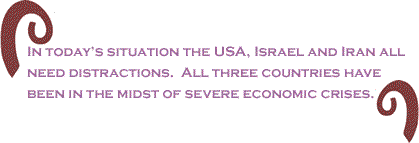|
In
watching the USA/Israeli vs. Iranian tensions play out,
I found myself thinking about the similarities with the
British/Argentine war in the early 1980s over the Falkland/Malvinas
Islands. Talk about a useless, purposeless war…except
for one thing. The ruling elites of both countries
needed it.
In
the early 1980s the Argentine military government was in
trouble and they knew it. Their regime was unraveling
and they desperately needed a means to hold things together.
Presto!! They began a pseudo-nationalist campaign
to regain control over the desolate Falkland/Malvinas Islands
that were occupied by Britain (since 1833). Hoping
to distract the Argentine population from the economic crisis
that combined with the savagery of the military dictatorship,
the junta carried out a military operation that under other
circumstances would have been the basis of a comedy.
Unfortunately the loss of life that accompanied this war
was nothing to laugh at.
Britain,
under Prime Minister Margaret Thatcher, needed its own distractions.
The Falklands/Malvinas Islands did not possess any strategic
importance to Britain but a nice little war did hold importance.
A quick, dirty, little war could, and did, distract the
British population from its own political and economic difficulties.
It also represented an opportunity for the citizens of a
dying empire to reassert themselves, much in the way that
a bully picks on a weak neighbor in order to reinforce their
own feelings of superiority.
There
were no good-guys in that war. It was a war that should
never have happened.
In
today’s situation the USA, Israel and Iran all need distractions.
All three countries have been in the midst of severe economic
crises. Hundreds of thousands of Israelis have protested
economic conditions in an unprecedented display of antipathy
toward the Israeli political establishment. Iran has
been unsettled ever since the emergence of the massive opposition
“Green Movement,” that followed the questionable elections
of 2009. The political challenges faced by the Iranian
theocracy accompany growing economic challenges which preceded
Western-imposed sanctions (though have been accelerated
by those sanctions). And, of course, we in the USA
are in the midst of the worst economic crisis since the
Great Depression.
The
USA cannot really afford a war with Iran (though this will
not necessarily stop the US from initiating one), a point
demonstrated just this past week with Obama’s announced
cuts to the Pentagon, the clear result of the impact of
the aggressive US wars against Afghanistan and Iraq.
Israel, which claims an existential threat from Iran, knows
full well that such a threat does not exist. The only
nuclear power in the Middle East is Israel, and any threat
to Israel from Iran would be met by a terrible response
from both Israel and the USA. But carrying out an
attack or encouraging the USA to carry out an attack on
Iran would both distract the Israeli population from domestic
concerns as well as provide a cover for Israeli military
operations closer to home, such as against Hezbollah in
Lebanon or against Hamas in the Gaza.

A
war with Iran would be a disaster for everyone. For
the Iranians, war would be used, much as with the Argentine
junta thirty years ago, to clamp down on dissent and wrap
everyone in the flag of nationalism. It would be a
chance to breathe more life into what appears to be a dying,
reactionary theocratic regime that has carried out brutal
repression for years, all the while claiming to be an anti-imperialist
force.
A
war would create greater instability in the Middle East
and more than likely encourage some countries that currently
do not possess nuclear weapons to seek them…in a hurry!
Such
a war could very likely lead to an even deeper global economic
crisis if the Straits of Hormuz are blocked by the Iranians,
thereby cutting off about 20% of the world’s oil.
It would also be a war that the West cannot, literally,
afford to conduct.
There
are many reasons to believe that a war will not happen precisely due to the potential catastrophe.
That said, there are elements in all three countries that
wish to militarily settle accounts with someone on the other
side and/or find an opportunity to use “patriotism”—the
last refuge of scoundrels, according to 18thcentury
British author Samuel Johnson—as a means of suppressing
domestic conflicts, particularly the growing demands for
political and economic justice.
Let’s
not get hood-winked.

BlackCommentator.com
Editorial Board member, Bill Fletcher,
Jr., is a Senior Scholar with the Institute for Policy Studies, the immediate past president
of TransAfricaForum and co-author of
Solidarity Divided: The Crisis in Organized Labor and a New Path
toward Social Justice (University of California Press), which examines the crisis of organized
labor in the USA. Click here
to contact Mr. Fletcher.
|

